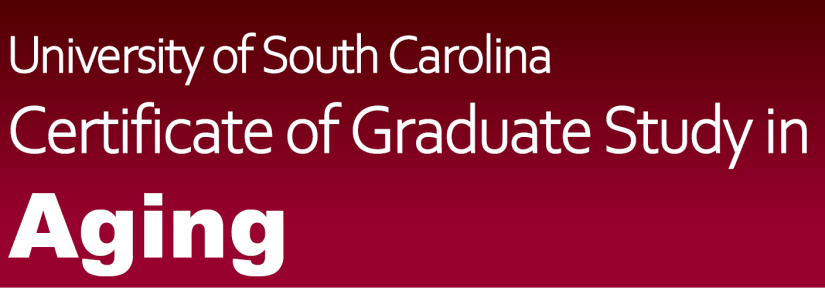November 20, 2019 | Erin Bluvas, bluvase@sc.edu
Approved in 1979 as the Certificate of Graduate Study in Gerontology and overseen initially by the university’s multidisciplinary Academic Committee on Gerontology and later by the College of Social Work, the Certificate of Graduate Study in Aging recently found a new name and a new home in the Arnold School’s Department of Health Promotion, Education, and Behavior (HPEB). Courses for the 18 credit-hour program of graduate-level courses begin in the spring semester of 2020.
“With the Arnold School’s Office for the Study of Aging, the Gerry Sue and Norman J. Arnold Institute on Aging, and the growing number of faculty and students engaged in aging-focused research and practice, we are thrilled that we are relaunching the certificate within the Arnold School in collaboration with our health sciences partners across campus,” says HPEB chair Daniela Friedman, who is co-director of the Office for the Study of Aging and a principal investigator (with social work professor Sue Levkoff) of the National Institute on Aging-funded Carolina Center on Alzheimer’s Disease and Minority Research.
While housing the program in the Arnold School provides students with access to numerous initiatives and researchers, the certificate has maintained its interdisciplinary approach. The core curriculum includes courses in health promotion; aging network policies, programs and services (social work); and long-term care administration (health services policy and management), as well as elective options across disciplines, such as social determinants of health, motivational interviewing, social and health policy, behavioral economics, and health communication – all with a focus on older adults.
“As a geriatrician and now a caregiver for elderly parents, issues of aging and aging well are very near to my heart, and the Certificate of Graduate Study in Aging is one important way that we support workforce development for the care of this special population,” says clinical assistant professor of internal medicine Donna Ray, who served as an instructor for the certificate program while a geriatric fellow. “Having the chance to engage with learners from various backgrounds and disciplines is an important part of fellowship training and provides the opportunity for us to develop our skills in teaching and in the interprofessional engagement that is critical to geriatric care.”
This layered and comprehensive approach to preparing students for careers working with older adults is needed more than ever before. Americans are living longer, changing the demographics in our society and economy and increasing the demand for health care and long-term care services.
There are currently over 50 million older adults (ages 65+) in the United States, and that number is projected to reach more than 80 million by 2050. South Carolina’s older adult population’s growth rate is among the top 10 fastest states, and this population expected to double by 2030 to 1.8 million.
The complexity of these challenges requires the efforts of research and outreach programs, like those within the Arnold School and across the university. It also demands an educated workforce – one that increases in size and knowledge in proportion to the tremendous growth and diverse needs of this population. The goal of the certificate program is to prepare students for capable and compassionate practice in order to promote the health and wellbeing of, and improve the quality of life for, older adults.
“When I talk to students, they agree almost unanimously that aging is an important topic, yet most of them do not recognize the implications of our aging society – and the great likelihood that many of their clients will be older adults – for their own personal careers,” says HPEB research associate and certificate program coordinator Katherine Leith. “They believe that learning how to provide competent services to adults in general prepares them for work specifically with older adults, but this is a misconception. The certificate will prepare them as gerontologists and help them to acquire the knowledge and skills to be competent practitioners in an aging-services setting and/or with older clients.”
The settings for aging-services include assisted living facilities, skilled nursing facilities, hospitals/clinics, home health agencies (e.g., personal care, hospice) and a variety of community-based organizations. As practitioners, students may hold roles such as case managers, health educators, program managers, advocates, or policy developers with governmental and non-governmental agencies.
“As the Baby Boom generation continues to age, the array of services and supports they will ultimately require will need to expand — as will the workforce available to deliver those supports,” says Lee Pearson, who co-directs the Office for the Study of Aging with Friedman. “The Certificate of Graduate Study in Aging provides an excellent path to preparing future professionals from a variety of disciplines to carry out this important and very meaningful work.”
Related:
Certificate of Graduate Study in Aging Flyer [pdf]
UofSC’s Excellence Initiative launches 8 high-impact projects
Alzheimer’s Disease Research Mentorship
Office for the Study of Aging marks 30th anniversary of South Carolina Alzheimer’s Disease Registry
Office for the Study of Aging gets new leadership
